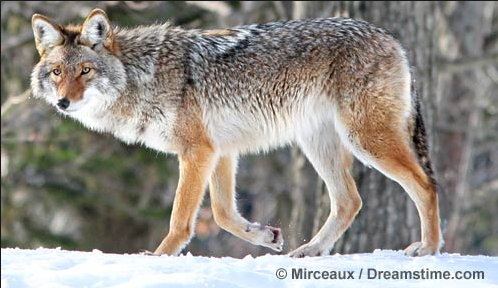Coyotes and your pets: Wildlife encounters of the dangerous kind
Coyotes like dumpster diving, of course, but they also like pig farms, compost piles, pet food (left outside) and fruit orchards and will nosh on bread thrown out for the birds. “Pets in neighborhoods with food attractants like these are at greater risk” for running into coyotes, Dr. Numi Mitchell s


Gabby received a luncheon invitation this week from a group of wildlife rehab men and women. The human pals of skunks, raccoons, feral kitties – and other critters that go bump in the night – had planned a fundraiser.
“Fun,” Gabby decided. “Let’s go.”
I had my doubts. The Peke-a-Poo diva’s first encounter with wildlife – a skunk that turned up in our backyard – had not turned out so happily.
It happened like this. On my way to work, I gave in to Gabby‘s little plea for one more romp in the backyard – fenced in but not critter proof. Too bad, that morning Pepe LePew had wandered in. I opened the door before I saw him.
Not his fault. I should have left for work already.
Suffice it to say, Pepe and Gabby did not make ze beautiful music together. Nope. They mixed it up. She barked. Pepe sprayed her. Never one to take the hint, Gabby gave chase. Around and around the bird bath they tore.
I tried to break it up, but I was one human against centrifugal force. Given their similar colors, I couldn’t tell them apart for a swirl of black and white fur disappearing behind puffs of dust and smoke.

Then Pepe broke through the lattice fence and escaped. Gabby crashed through right after him. I caught her in the front yard in time to prevent her from running into the street.
Yep, all those clothes went into the dustbin. And I didn’t like that job anyway.
But that was then, and now she received the invitation for an “exciting” buffet.
So, why exciting? I wanted to know.
Despite my misgivings, Gabby convinced me the organizers meant exciting in a good way and she probably wouldn’t be on the menu. Besides, wildlife should be her new frontier. She’s written reams about pets and farm animals and wants to keep going with those stories. But it does seem high time to explore the world of Nature, especially because our back yard is still a popular haunt. (Witness little tracks in the snow from time to time.)
But where to begin?
“Enter Dr. Numi Mitchell, biologist and coyote expert. Mitchell tracks coyotes down in Jamestown, R.I., and across Aquidneck Island. She’s with the Narragansett Bay Coyote Study and www.coyotesmarts.org. We ran into her a few weeks ago in Jamestown on a story about a coyote that attacked a dog at house near Beavertail State Park in Jamestown.

Normally, coyotes steer clear of people’s houses, Mitchell said. But this time, the coyote took up a position right by the house. When the pet sitter – another human who didn’t look first – opened the door to let the dog out; the coyote sprang.
According to Mitchell, coyotes turn bold when people start feeding them.
Although that dog on Beavertail did survive, a little dog in the same neighborhood went missing. The coyote is the prime suspect.
Mitchell catches the coyotes, outfits them with navigational collars (GPS) and learns where they go for food.
Coyotes like dumpster diving, of course, but they also like pig farms, compost piles, pet food (left outside) and fruit orchards and will nosh on bread thrown out for the birds.

“Pets in neighborhoods with food attractants like these are at greater risk” for running into coyotes, Mitchell said.
Partly on Mitchell’s advice, all the Aquidneck Island cities and towns have decided to notify people who are feeding. The first step is education, Mitchell said. But if the people will not cooperate, the police step in.
This week, the first case went to court, and Municipal Court Judge Richard D’Addario fined a Portsmouth, R.I., woman $50 for feeding the coyotes. She ended up paying $100, when the judge added $50 extra in court costs.
Coyotes do come through the Gabby Dog’s neighborhood – one reason why outdoors was off-limits for Charlie, the black cat, Twila and Nickel.
And Gabby, who weighs 15 pounds soaking wet, also meets the criteria for prey, so she stays inside too, unless I’m with her. I was so much help, she has reminded me, that time when the skunk came by.
So, was the Jamestown coyote sort of like Pepe?
Maybe Pepe simply misunderstood the concept of time-sharing and wasn’t looking for food, I told her. I’ll have to ask another expert. But meanwhile, I will look before I open the door.
Have a tip or story idea? E-mail Margo Ann Sullivan at TheGabbyDog@gmail.com and Follow @The_Gabby_Dog on Twitter
You

’re one click away! Sign up for our free eNewsletter and never miss another thing.

Margo Ann Sullivan is a pet columnist who has written for ZooToo, and numerous publications in New York and in New England. She’s had pets all her life, starting with a rescue collie named Lollypop. The Gabby Dog column chases the news that helps pets and people. It also chronicles the adventures of Gabby, the peke-a-poo, and Asia, the tabby cat, and their many pals, hitting the high spots between Providence, RI, and Manchester, NH.
GMT
|
Detect language Afrikaans Albanian Arabic Armenian Azerbaijani Basque Belarusian Bengali Bosnian Bulgarian Catalan Cebuano Chichewa Chinese (Simplified) Chinese (Traditional) Croatian Czech Danish Dutch English Esperanto Estonian Filipino Finnish French Galician Georgian German Greek Gujarati Haitian Creole Hausa Hebrew Hindi Hmong Hungarian Icelandic Igbo Indonesian Irish Italian Japanese Javanese Kannada Kazakh Khmer Korean Lao Latin Latvian Lithuanian Macedonian Malagasy Malay Malayalam Maltese Maori Marathi Mongolian Myanmar (Burmese) Nepali Norwegian Persian Polish Portuguese Punjabi Romanian Russian Serbian Sesotho Sinhala Slovak Slovenian Somali Spanish Sundanese Swahili Swedish Tajik Tamil Telugu Thai Turkish Ukrainian Urdu Uzbek Vietnamese Welsh Yiddish Yoruba Zulu |
Afrikaans Albanian Arabic Armenian Azerbaijani Basque Belarusian Bengali Bosnian Bulgarian Catalan Cebuano Chichewa Chinese (Simplified) Chinese (Traditional) Croatian Czech Danish Dutch English Esperanto Estonian Filipino Finnish French Galician Georgian German Greek Gujarati Haitian Creole Hausa Hebrew Hindi Hmong Hungarian Icelandic Igbo Indonesian Irish Italian Japanese Javanese Kannada Kazakh Khmer Korean Lao Latin Latvian Lithuanian Macedonian Malagasy Malay Malayalam Maltese Maori Marathi Mongolian Myanmar (Burmese) Nepali Norwegian Persian Polish Portuguese Punjabi Romanian Russian Serbian Sesotho Sinhala Slovak Slovenian Somali Spanish Sundanese Swahili Swedish Tajik Tamil Telugu Thai Turkish Ukrainian Urdu Uzbek Vietnamese Welsh Yiddish Yoruba Zulu |
Text-to-speech function is limited to 100 charactersOptions : History : Help : FeedbackClose





